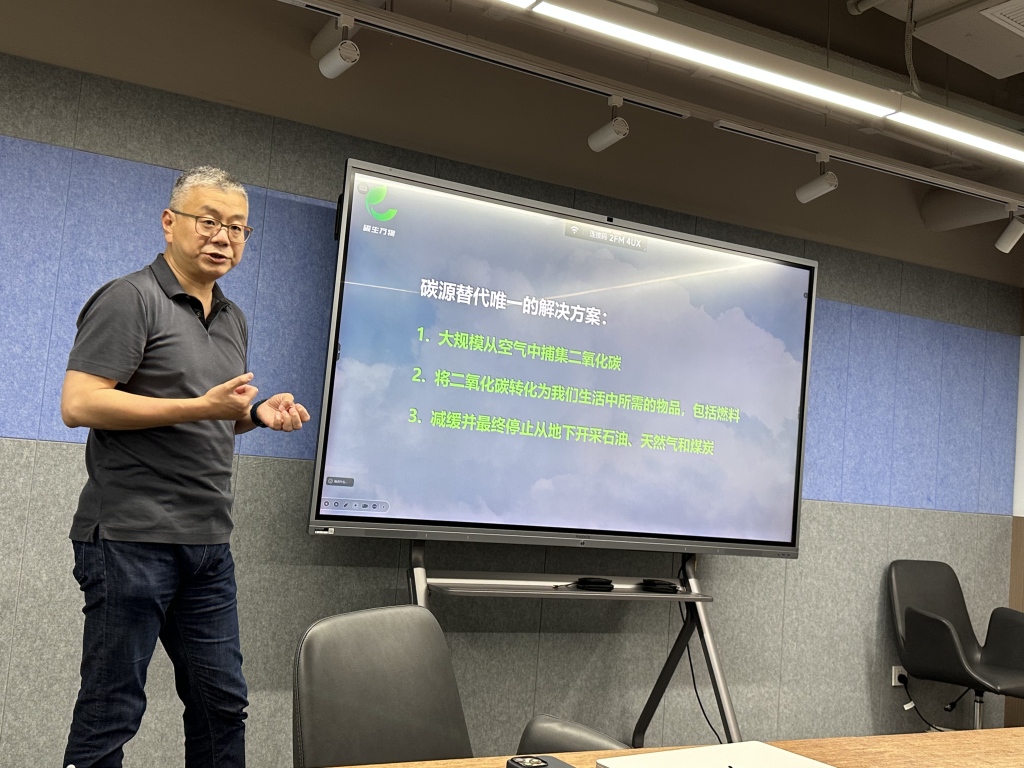Key Points
- Ren Yuxiang (Ren Yuxiang 任宇翔), former Tesla Global VP and a foundational figure in Tesla’s Shanghai Gigafactory, launched Carbon Origin, a venture aiming to turn captured atmospheric CO2 into Sustainable Aviation Fuel (SAF).
- Carbon Origin focuses on creating an “alternative carbon source” by capturing CO2 directly from air or oceans, rather than traditional industrial carbon capture. Their philosophy, “carbon gives birth to all things,” reflects a broader vision beyond just aviation fuel.
- The company secured tens of millions of RMB in angel funding from investors like Sequoia China (Hongshan Zhongguo 红杉中国) and Yellow River Delta Investment (Huanghe Sanjiaozhou Touzi 黄河三角洲投资), indicating strong financial backing.
- Their first product, SAF, targets a massive and growing market, with global aviation fuel demand projected at 400-500 million tons annually by 2030, and SAF selling for $2,000 to $3,000 USD per ton.
- Carbon Origin is rapidly progressing, having signed an agreement for a ¥300 million RMB ($41.4 million USD) research and innovation center in Shanghai Lingang, with an aggressive timeline to produce the first barrel of SAF by the end of 2025.

One of the key players who helped Elon Musk solve Tesla’s “production hell” with the Gigafactory in Shanghai is back with a new, wild mission. His name is Ren Yuxiang (Ren Yuxiang 任宇翔), and his new venture, Carbon Origin, plans to literally pull carbon dioxide from the air and turn it into sustainable aviation fuel (SAF).
Nine months after co-founding the company with Zhang Hongxi (Zhang Hongxi 张鸿曦), Ren is confident.
“We are very confident in our 1.0 product,” he said, “and now we are exploring 2.0 and 3.0 products.”
This isn’t just another green-tech pipe dream.
It’s backed by a world-class team, serious investors, and the same local government that helped make Tesla’s China story a massive success.
Let’s break down what they’re building.
The Big Idea: From Tesla’s China Architect to ‘Carbon Gives Birth to All Things’
If you followed Tesla’s rise, you might know Ren Yuxiang’s name.
He was a classmate and close friend of Elon Musk.
He joined Tesla in 2015, eventually becoming the Global VP of Sales and the highest-ranking Chinese executive at the time.
Crucially, he was a foundational figure in bringing the Tesla Gigafactory to Shanghai, a move that was life-or-death for the company.
Now, he’s returning to his hometown of Shanghai for his first entrepreneurial venture in China, Shanghai Carbon Origin Technologies Co., Ltd. (Shanghai Tansheng Wanwu Keji Youxian Gongsi 上海碳生万物科技有限公司).

Find Top Talent on China's Leading Networks
- Post Across China's Job Sites from $299 / role
- Qualified Applicant Bundles
- One Central Candidate Hub
Your First Job Post Use Checkout Code 'Fresh20'

The company name, ‘Carbon Origin,’ translates from “Tansheng Wanwu,” which literally means “carbon gives birth to all things.”
It’s not just a cool name; it’s their entire philosophy.
They don’t see themselves as just an aviation fuel company.
They have a much bigger, long-term vision: to create a new source for the essential carbon-based products our modern world relies on.

ExpatInvest China
Grow Your RMB in China:
- Invest Your RMB Locally
- Buy & Sell Online in CN¥
- No Lock-In Periods
- English Service & Data
- Start with Only ¥1,000

The First-Principles Play: Why This Isn’t Just Another ‘Carbon Capture’ Project
When you hear “carbon capture,” you might think of CCUS (Carbon Capture, Utilization, and Storage) projects that bolt onto smokestacks at coal plants.
Ren says that’s not what they’re doing. He calls that approach “a somewhat hypocritical act.”
It’s like paying someone to clean up your trash after you’ve already thrown it on the street. The better way? Don’t litter in the first place.
His logic, based on first-principles thinking, goes like this:
- The real key to hitting carbon neutrality is to stop extracting oil, natural gas, and coal.
- But to do that, you need to find alternative energy sources AND alternative carbon sources.
- Finding alternative energy sources is happening. We have wind, solar, nuclear, and hydro power scaling up, especially in China.
- But finding an alternative carbon source is the unsolved problem. Industrial flue gas and biomass just can’t scale to meet demand.
- The only real solution? Capture CO2 directly from the air or oceans on a massive scale and turn it into the products we need.
The goal is to achieve a “carbon cycle above the surface,” as Ren puts it.
Why hasn’t this been done before?
“In the past 250 years, humanity probably never thought there was a need… because energy and carbon sources were too easily accessible,” Ren explains.

Resume Captain
Your AI Career Toolkit:
- AI Resume Optimization
- Custom Cover Letters
- LinkedIn Profile Boost
- Interview Question Prep
- Salary Negotiation Agent

The Money Talk: Sequoia and a Mystery Investor Bet Big
Talk is cheap, but capital makes things happen.
Carbon Origin just closed its angel round of financing, securing tens of millions of RMB.
The investors include some heavy hitters:
- Sequoia China (Hongshan Zhongguo 红杉中国)
- Yellow River Delta Investment (Huanghe Sanjiaozhou Touzi 黄河三角洲投资)
- …and a new, undisclosed Chinese internet industry investor.
The cash will be used to fuel R&D, build out their industrial projects, and expand market channels.
It’s a strong vote of confidence in a company that, until now, has operated mostly in stealth.

The First Target: A Trillion-Dollar Bet on Sustainable Aviation Fuel (SAF)
So, what’s product 1.0?
Sustainable Aviation Fuel (SAF).
According to co-founder Zhang Hongxi, the choice was purely practical. “The first product we make must have commercial logic… we must be profitable.”
Here’s why SAF makes sense:
- There’s a massive, growing market. Global aviation fuel demand is projected to hit 400-500 million tons annually by 2030, with China accounting for a quarter of that.
- There’s a significant green premium. SAF currently sells for $2,000 to $3,000 USD per ton. In the long run, this is a potential trillion-level market in China alone.
- It’s a long-term play. Zhang believes electric aircraft won’t be a reality for another 30 to 50 years. Planes will need jet fuel.
- Regulators are creating demand. The EU’s “ReFuelEU Aviation Regulation” mandates SAF blending of at least 2% by 2025, rising to 70% by 2050. China is also pushing SAF adoption.
The biggest hurdle? Cost.
Right now, global SAF production is less than 0.2% of total demand because it’s so expensive.
But Ren isn’t worried. He compares it to photovoltaics and lithium batteries, which were “very expensive” at first.
“Once production volume increases… once Chinese enterprises can participate in this on a large scale, costs will drastically decrease.”

The Roadmap: From Lab to Commercial Scale… Fast
Carbon Origin is moving quickly.
They just signed an agreement to launch their first research and innovation center in Shanghai Lingang with a total investment of ¥300 million RMB ($41.4 million USD).
This center will be home to their first pilot production line.
Here’s their aggressive timeline:
- 2024-2025: Conduct pilot validation.
- End of 2025: Produce the very first barrel of sustainable aviation fuel.
- 2026: Advance to a thousand-ton level pilot project.
- 2027: Launch a hundred-thousand-ton level commercial project.
- 2028 onwards: Continuously optimize costs and expand their green carbon product lineup for the global market.

Why Lingang, Again? The ‘Tesla Playbook’ for Climate Tech
This is Ren Yuxiang’s second major collaboration with Shanghai Lingang, the same special area where the Tesla Gigafactory was built.
That’s no coincidence.
Ren chose China for three key reasons:
- Renewable Energy: China is a global leader in abundant, cheap renewable energy—a critical input for their process.
- Industrial Powerhouse: To do this fast and at scale, you need China’s deep pool of chemical talent and its complete industrial supply chain.
- Policy Support: China’s “dual carbon” goals create a massive tailwind for low-carbon technology companies like Carbon Origin.
The Lingang government is rolling out the red carpet.
Wu Xiaohua (Wu Xiaohua 吴晓华), Deputy Secretary of the Lingang Special Area, called it his “second collaboration with Mr. Ren Yuxiang,” adding, “I am full of confidence in this project.”
Lingang is providing wrap-around support, helping with:
- Talent: Aiding with settlement, apartments, and schooling to attract top engineers.
- IP Protection: Using the Shanghai Technology Exchange to protect and commercialize their tech.
- Growth Planning: Fostering the company from a startup to a potential unicorn.
- Capital Access: Connecting them with banks and other financial institutions.
The relationship is moving at light speed. The deal came together in half a year, a process that would normally take one or two years.
While the R&D center and pilot line are set for Lingang, Ren notes that future large-scale commercial plants will likely be in areas with low population density and rich wind and solar resources.
With its audacious vision, elite team, deep-pocketed backers, and a proven playbook for execution in China, we’ll be keeping a close eye on Carbon Origin.

- Company Name: Shanghai Carbon Origin Technologies Co., Ltd. (上海碳生万物科技有限公司)
- Meaning: “Tansheng Wanwu” (碳生万物) translates to “carbon gives birth to all things.”
- Vision: Not just an aviation fuel company, but aims to create a new source for essential carbon-based products.
- Approach to Carbon: Focus on capturing CO2 directly from air/oceans as an “alternative carbon source” rather than traditional industrial carbon capture.
- Goal: Establish a “carbon cycle above the surface” to reduce reliance on extracted fossil fuels.
- Renewable Energy Leadership: China offers abundant and cheap renewable energy, crucial for Carbon Origin’s processes.
- Industrial Powerhouse: Access to China’s deep chemical talent pool and complete industrial supply chain for rapid scaling.
- Policy Support: Alignment with China’s “dual carbon” goals provides strong governmental backing for low-carbon tech.
- Proven Lingang Playbook: Ren Yuxiang’s successful prior collaboration with Shanghai Lingang (Tesla Gigafactory).
- Comprehensive Lingang Support: Aid with talent attraction (settlement, housing, schooling), IP protection, growth planning (from startup to unicorn), and capital access (banks, financial institutions).



